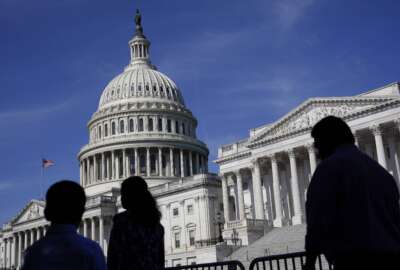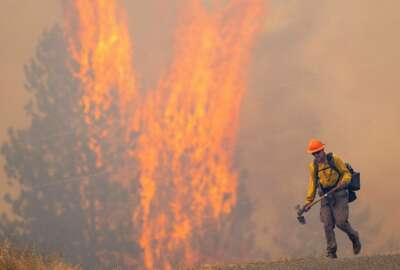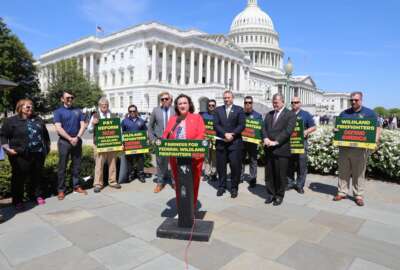Despite massive bipartisanship, a pay raise for federal wildland firefighters is still at risk
Between one-third and one-half of federal wildland firefighters would resign if Congress doesn’t make a temporary pay raise permanent, the National Federation of...
Among growing concerns of a potential government shutdown, federal wildland firefighters are making a final push on Congress to get another time-sensitive item across the finish line.
With just a few weeks left before a steep pay cliff, wildland firefighters are meeting with congressional leaders this week to add even more urgency to pending legislation that would install a permanent pay raise for the frontline workers.
Federal wildland firefighters received a significant pay boost under the Infrastructure Investment and Jobs Act — but it was only temporary. The $600 million that funded the two-year pay increase will run out at the end of September.
“We never expected that we would get this close to the deadline,” Justin Brown, a federal wildland firefighter, said in an interview. “We thought that this would have been solved by now.”
The Wildland Firefighter Paycheck Protection Act is the solution that firefighters and other advocates are trying to champion. The bicameral legislation, first introduced in July, would offer the workers the lower amount between either a 50% base pay raise or a $20,000 salary boost. Wildland firefighters have been urging the passage of the bill for months.
Without the passage of the legislation, federal firefighters will see major reductions to their paychecks starting Oct. 1. Some workers’ salaries will be cut down to $15 per hour.
“The biggest issue we just keep running into is getting it across the finish line,” Brown said. “That’s what we’re here trying to push, but it’s been difficult — we keep going back and forth.”
The National Federation of Federal Employees, the union that represents many wildland firefighters, said without a permanent solution, there will be a “mass exodus” of firefighters.
Falling off the pay cliff would only exacerbate retention challenges that are already increasingly difficult for the Interior Department and the Department of Agriculture’s Forest Service. The two agencies employ roughly 17,000 wildland firefighters combined.
NFFE estimates that between one-third and one-half of federal wildland firefighters would resign if a permanent pay raise isn’t enacted.
“In wildfire prevention we are already understaffed nationwide. This pay cliff will just make things considerably worse,” NFFE National President Randy Erwin told Federal News Network. “If Congress allows this pay cliff to happen, the federal government will not have a workforce to protect our lands from the wildfire crisis.”
Interior and the Forest Service have spent years struggling with recruitment and retention of the frontline workforce, especially as wildfire seasons become longer and more intense. Long hours, low pay, limited opportunities for career advancement and poor work-life balance are just a handful of the challenges that federal firefighters face.
A 2022 GAO report found that low pay was the top barrier to firefighters’ recruitment and retention.
“These workers will not be able to afford to live on the meager salaries they would be forced to accept after the pay cliff is reached,” Erwin said. “I am really scared to see what will happen if Congress cannot get this done. We will lose our capacity to contain wildfires in this country right in the middle of fire season.”
Both the House and Senate companion bills for the Wildland Firefighter Paycheck Protection Act have strong bipartisan support. The Senate bill, which Sen. Kyrsten Sinema (I-Ariz.) introduced, advanced favorably out of the Homeland Security and Government Affairs committee in a 10-1 vote in July. On Sept. 11, the bill was placed on the Senate’s legislative calendar, but it has not yet received a floor vote.
Unlike the Senate, there has not been any action on the House bill since Rep. Joe Neguse (D-Colo.) introduced it in August. The legislation was referred to the Oversight and Accountability committee, but lawmakers have not taken it up.
Another bill, the Tim Hart Wildland Firefighter Classification and Pay Parity Act — or “Tim’s Act” for short — would similarly cement the raise for federal firefighters. But among highly partisan government appropriations debates, proponents of the firefighters’ pay raise bill are concerned.
“We’re hoping that at least they can try and put our bill and all these things that we’ve been asking for into a continuing resolution and try to get it done that way, just so that we can at least keep everyone from walking,” Brown said. “But our ultimate goal is a permanent fix without any sunset clauses on it.”
The White House is similarly pushing Congress to make the raise permanent. The Biden administration urged lawmakers in August to approve additional funding for wildland firefighters as part of a $40 billion supplemental funding request for the first quarter of fiscal 2024. The goal is to address immediate priorities that can’t wait on Congress to pass a full-year government spending package.
“This $20,000 at least allowed us to be able to pay our bills and for some people to stop having to live in their cars just to get by,” Brown said. “It gave us just enough of a wage that we could actually survive. That’s all we’re asking for — to try and survive in a job that we all take pride in.”
Copyright © 2025 Federal News Network. All rights reserved. This website is not intended for users located within the European Economic Area.
Drew Friedman is a workforce, pay and benefits reporter for Federal News Network.
Follow @dfriedmanWFED






